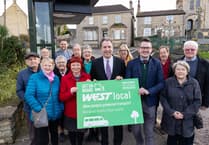‘Challenge forces of greed’
Dear editor,
One of Labour’s pledges in government is to build an NHS fit for the future, and given the disastrous problems imposed by the Tories throughout the public sector from health, education to the state of our roads they have enormous challenges to reform the entire public sector into more workable systems.
The way to do this is to challenge the forces of greed, cronyism and individualism by reversing privatisation of public services, reinstate value for money staff, and reduce the high level of senior management earning ridiculously high salaries to a more normal level. Senior management post holders need to prove they are fit for the job rather than being appointed without qualification to serve the interest of the dominant political party.
The inept have never grasped the concept that they are public servants, and not part of an old boys network or a "jobs for the boys" closed system. Since 2007 we have seen ideological changes within B&NES Council and it is true to say that over recent decades many public sector organisations changed from meritocratic systems to short term cronyism, that has resulted in crumbling public services through the asset stripping of cash to line the pockets of the few and filter money into private sector interests and investments.
A lot of money has been wasted on private business that are not up to standard, or paying private staff agencies to replace well trained staff with inferior replacements. A percentage of good staff lost represented whistleblowers unhappy with falling standards posing a threat to the status quo, and dedicated staff leaving because they felt mistreated, underpaid and undervalued while a lot of money was spent on recruiting more senior management encouraged by the salary hikes and gold plated pensions.
We only have to look at examples of the water and railway sectors to know how privatisation has not worked, making essential public services expensive and unworkable, but returning massive profits for investors. In spite of a change of government, public services are still being run by the faithful of the previous government, maintaining privately outsourced public services, replacing what was once a loyal and capable workforce and systems with a dependency on a high degree of overpaid chiefs requiring more and more of our cash.
The NHS, for instance, was once the envy of the world until the Tories selfishly mismanaged it to near destruction. They did this by delivering healthcare with a profit motive, demoralising staff and imposing high parking charges for essential workers, causing the public sector to lose skills and people. Studies have shown that increased privatisation is associated with lower quality of care, including higher rates of patient infections and avoidable deaths.
In order to rebuild the NHS with proper reforms, Labour needs to regulate and make transparent how public money is prioritised in investing more in primary care and fully qualified GPs, the retention of doctors and nurses with less reliance on international recruitment to deliver excellent patient centred care, free at the point of delivery. We need more capital investment to fix buildings, to develop an effective social care policy with money saved through removing need for "for-profit healthcare" and duplication and reinventing of the wheel. We need to eradicate private monopolies, and improve the culture by upgrading senior corporate management competency and decision making. We must commit to retaining the NHS as a public organisation through the implementation of good equal opportunity policies and social mobility.
Yours sincerely
Delyth Morris
Peasedown St John.
---
‘Inadequate’ lighting
Dear editor,
Last weekend I had the misfortune of having to walk up Frome Hill in Radstock up to the Fromeway Inn after dark.
The lighting is totally inadequate on the main road. In fact the headlights of the traffic is quite helpful. However, the worst part of that short walk was opposite the road leading up to Southfields. At that point there is another area of darkness and this is because the trees there are so big that a lamppost is buried in the greenery.
Surely either the council or Highways Department are responsible for this lighting and should ensure that all the lampposts are able to give the most light possible.
With regards,
Lynn O'Brien,
Radstock.
---
Policy makes ‘no sense’
Dear editor,
Few people actually want to see parking charges introduced in Midsomer Norton, apart from those perhaps who don’t use car parks yet whose Council Tax pays for maintenance, and like many people, I was very concerned about their introduction and the effect this might have on high street trade.
Many local businesses, it has been said, depend on people buying only a few items so charging for short stays would discourage people from shopping on the high street when free parking is available elsewhere. This is why I’m relieved Bath & North East Somerset Council listened to residents and granted a two-hour free parking period, the so-called “Auton Compromise”, after Cllr Mike Auton successfully made this case when it looked as though there would be either a very short free period, or none at all.
B&NES emissions based charging, however, makes no sense and should be challenged. Instead of charging based on the harmful chemicals from vehicle exhausts, charges will instead be based on carbon dioxide emissions. Modern exhaust systems specifically convert pollutants, such as nitrogen dioxide (smog), into carbon dioxide, the gas humans exhale when they breathe. London’s Ultra Low Emissions Zone (ULEZ) is based on a vehicle’s emissions rating, EURO 6, for example. If they are genuinely concerned about air quality, B&NES should do the same.
Many thanks,
Gordon Mackay (in a personal capacity)
Midsomer Norton
---
‘Dicing with death’
Dear editor,
As a Bristolian from birth, I am well versed on traffic. However, the crazy drivers passing key sites such as Jacarandas, hardware and charity shops make crossing the road a dice with death.
Surely, with the increase in commerce, speed cameras should be employed for a half a mile stretch and make some revenue rather than penalising shoppers with prams. It is difficult for a parent or guardian to cross the road, as well as the fumes generated Y.
Yours,
Richard Ellis.
---
Driving in the snow
Dear editor,
As snow is expected to fall in parts of the country next week and over coming months and drivers should be wary of potentially dangerous road conditions.
It's recommended not to drive if the roads are bad, but this can't always be helped. If you do need to drive, these tips could help:
Allow plenty of time for your journey as you may need to drop your speed to navigate trickier road conditions
- If you can, stick to major roads as they're more likely to be gritted
- When driving, accelerate gently, and get to the highest gear as quickly as you can
- Leave as much as 10 times the recommended stopping distance between you and the car in front
- If you skid, steer into it gently. Don’t slam on the brakes.
- Use dipped headlights in heavy snow to ensure lights on the back of your car are showing.
For more helpful advice, our guide to driving in the snow can help you best prepare to keep safe on the roads.
Rhydian Jones, motor expert at Confused.com car insurance
---



.jpeg?width=209&height=140&crop=209:145,smart&quality=75)

Comments
This article has no comments yet. Be the first to leave a comment.